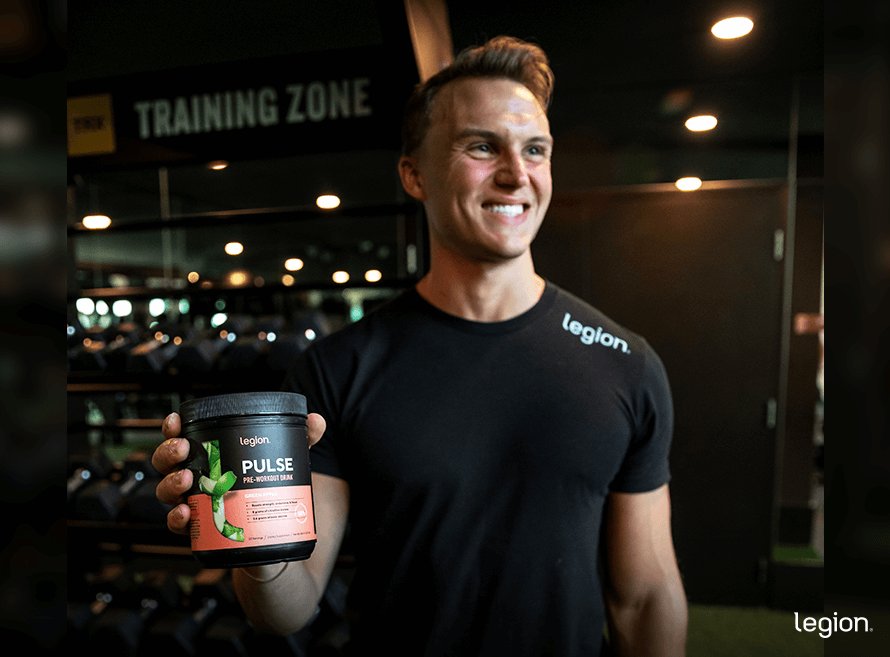
You’ve taken your pre-workout supplement, you’re fired up to train, and then someone’s hogging the squat rack—and now you’re wondering: how long does pre-workout last?
The worry is that it’ll wear off before you even touch a barbell and your workout will be a bust.
The good news is, pre-workout’s effects don’t fade that fast—you’ve usually got at least a couple of hours before they start to taper off.
In this article, you’ll learn exactly how long pre-workout lasts, what affects it, and how to time it so you get the biggest performance boost.
Key Takeaways
- Most pre-workouts last around 1–2 hours, though caffeine can remain in your system for up to 5 hours or longer depending on your metabolism.
- Genetics and tolerance both play a role. Fast caffeine metabolizers or regular users tend to feel it wear off sooner, while more sensitive people often feel it last longer.
- Take pre-workout 30–60 minutes before training to feel its peak effects during the toughest parts of your workout.
- Avoid pre-workout within 6–8 hours of bedtime to prevent caffeine from disrupting your sleep—or, if you train late in the day, switch to a stim-free pre-workout instead.
- For a pre-workout containing proven ingredients in effective doses, no unnecessary junk, and that’s verified by independent lab testing, try Pulse.
What Are Pre-Workout Supplements?
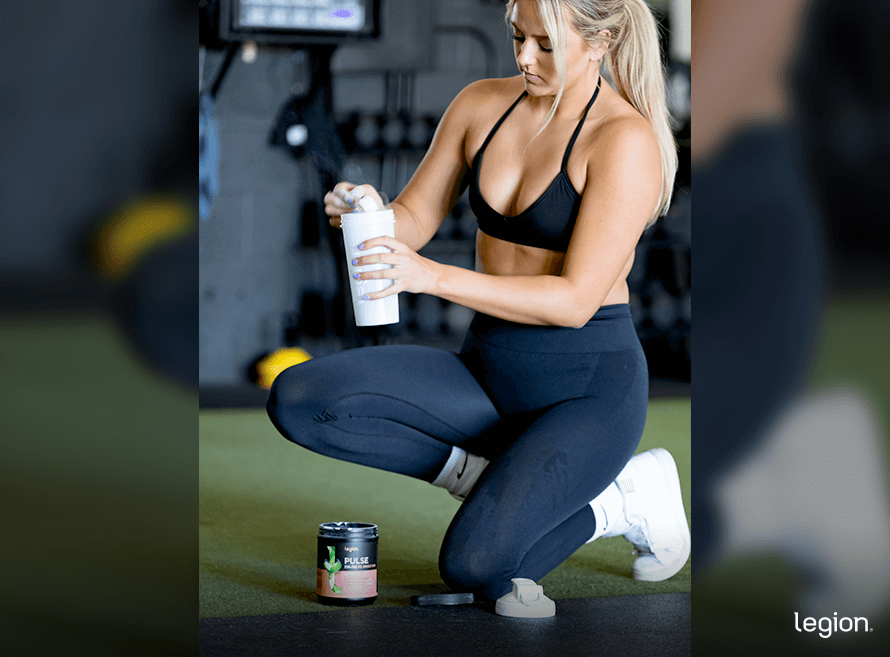
A pre-workout supplement, or “pre-workout” for short, is a sports nutrition supplement taken before training to enhance energy levels and athletic performance.
Typically, a pre-workout supplement is a powder that you mix with water and drink.
Common Pre-Workout Ingredients
There are thousands of pre-workouts on the market, each boasting a unique blend of ingredients.
Despite this diversity, some ingredients are more commonplace than others. Here are some of the most popular ingredients and their benefits:
- Caffeine: Caffeine increases alertness and reduces perceived effort and fatigue. The dehydrated and powdered form of caffeine, caffeine anhydrous, is perhaps the most common ingredient in pre-workout formulas.
- L-Citrulline: L-citrulline increases nitric oxide production in the body, enhancing blood flow and boosting oxygen and nutrient delivery to muscles, which can improve performance, reduce fatigue, and accelerate recovery.
- Beta-Alanine: Beta-alanine is an amino acid that increases muscle concentrations of carnosine. It helps diminish the downsides of acid buildup in your muscles, boosting athletic performance during high-intensity exercise.
- L-Theanine: L-theanine can help smooth out caffeine’s stimulatory effects, leading to a more focused and less jittery energy boost.
- Betaine: Betaine helps improve muscle endurance and increases strength. It may also play a role in muscle protein synthesis.
- Alpha-GPC: Alpha-GPC enhances cognitive function and increases power output, making it beneficial for activities that require both mental and physical exertion.
- Creatine: Creatine helps you produce more ATP, a key energy source for heavy lifting and high-intensity exercise. While taking creatine before training is unnecessary, many supplement manufacturers include creatine in their pre-workout supplement formulations.
- L-Tyrosine: L-tyrosine is a precursor to neurotransmitters like dopamine and adrenaline, helping to increase focus and alertness during workouts.
- Taurine: Taurine may reduce muscle damage and fatigue and support metabolic processes and energy production.
How Long Common Pre-Workout Ingredients Last: At a Glance
If you’re just looking for a quick breakdown of how long pre-workout usually lasts, here’s a quick reference:
(We’ll go into more detail below.)
How Long Common Pre-Workout Ingredients Last: At a Glance
| Ingredient | Primary Effects | Approximate Duration |
|---|---|---|
| Caffeine | ↑ Mood and energy levels ↑ Focus, drive, and wakefulness ↑ Metabolic rate ↑ Strength and power ↑ Endurance | ~5 hours (varies widely between individuals) |
| L-Citrulline | ↑ Muscle endurance ↑ Strength and power ↓ Muscle soreness ↓ Perceived effort during exercise | ~40–75 minutes (dose-dependent) |
| Beta-Alanine | ↑ Muscle endurance during 1–4-minute bouts (e.g., circuits, supersets) ↑ Anaerobic exercise capacity | N/A (effects are cumulative with daily use) |
| L-Theanine | ↓ Effects of mental stress ↑ Relaxation ↑ Mood, memory, and attention (when paired with caffeine) | ~1–1.5 hours |
| Betaine | ↑ Muscle endurance ↑ Strength and power | ~1 hour (may extend with continued use) |
| Alpha-GPC | ↑ Power output ↑ Cognitive function | ~2 hours (choline levels remain elevated for up to 2 hours) |
| L-Tyrosine | ↓ Effects of acute stress and fatigue ↑ Cognitive performance and focus | ~2–3 hours |
| Taurine | ↑ Focus, attention, and reasoning (with caffeine) ↓ Jitters and “crash” effects ↓ Rapid glucose release into blood | ~1–3 hours |

How Long Does Pre-Workout Last?
How long a pre-workout lasts depends on each active ingredient’s half-life.
An ingredient’s half-life refers to the time it takes for the body to eliminate half of the substance or how long it takes for the substance to lose half of its pharmacologic, physiologic, or radiologic activity.
In the context of nutrition and supplements, this concept is often applied to understand how long a substance remains active or effective in the body.
The half-lives of the above ingredients are as follows:
- Caffeine: Caffeine’s half-life is approximately 5 hours, though this varies widely depending on individual factors such as metabolism and tolerance.
- L-Citrulline: The half-life of L-citrulline increases with the dose, ranging from ~40–75 minutes for doses of 2–15 grams.
- Beta-Alanine: Beta-alanine’s half-life is approximately 25 minutes. However, as its benefits come from long-term, cumulative use, its half-life has little bearing on how long its effects last.
- L-Theanine: L-theanine’s half-life is typically just over an hour.
- Betaine: Betaine has a half-life of around 60 minutes, though this may extend with continued use.
- Alpha-GPC: Studies show that after taking alpha-GPC, choline levels increase for up to 2 hours.
- Creatine: While creatine monohydrate has a half-life of about 90 minutes, its effectiveness extends far beyond this timeframe, provided you use it daily for an extended period.
- L-Tyrosine: L-tyrosince’s half-life is 2–3 hours.
- Taurine: Taurine’s half-life is 1–3 hours.
Factors That May Affect How Long Pre-Workout Lasts
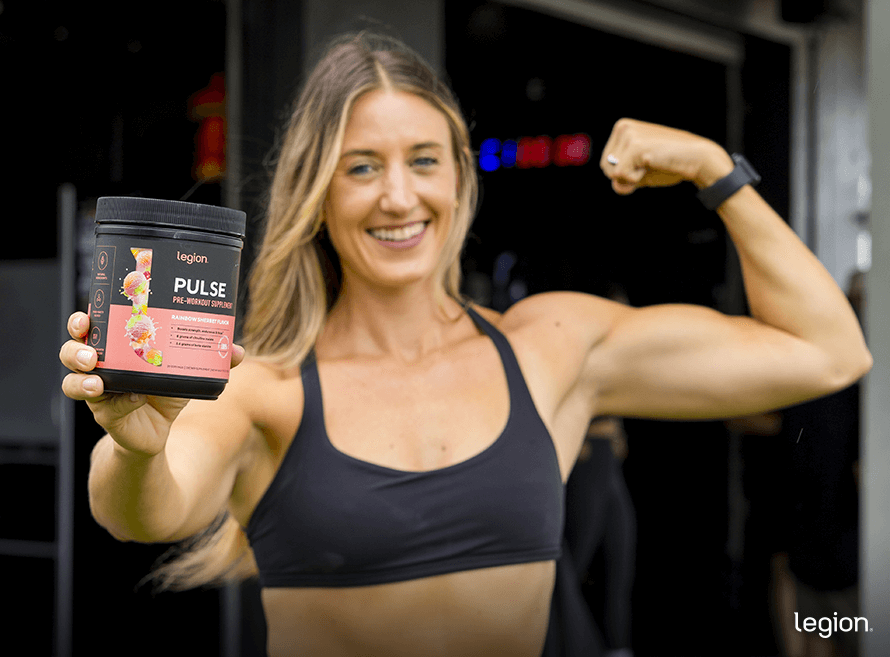
How long a pre-workout lasts doesn’t just depend on its ingredients—your genetics and tolerance can also play a part. Here’s how:
Genetics
Some people are naturally more sensitive to caffeine’s effects and tend to feel it kick in sooner and last longer. Others metabolize it quickly and notice it wear off faster.
These differences are largely genetic—variations in certain genes like CYP1A2 and ADORA2A influence how your body processes caffeine and how strongly it affects you.
Habituation
The more often you use caffeine, the more your body adapts to it. Over time, you may not feel as strong or as long-lasting of a boost compared to when you were more sensitive to it.
How to Time Your Pre-Workout to Maximize Its Effects
Take your pre-workout about 30–60 minutes before you train to get the most out of it.
If you take it and end up getting delayed—say, you hit traffic or someone’s camped out on the bench or squat rack—don’t worry, you haven’t wasted it.
Most pre-workout ingredients remain effective for at least 1–2 hours after they kick in, so as long as you start your workout within that window, you’ll still feel most of the benefits.
If your session gets pushed back beyond that, the stimulant effects may begin to fade—especially if you’re a fast caffeine metabolizer or have a high tolerance.
But don’t take another dose—doubling up can push your daily caffeine intake to unsafe levels and greatly increase your risk of side effects like jitters, nausea, or insomnia.
Benefits of Taking Pre-Workout
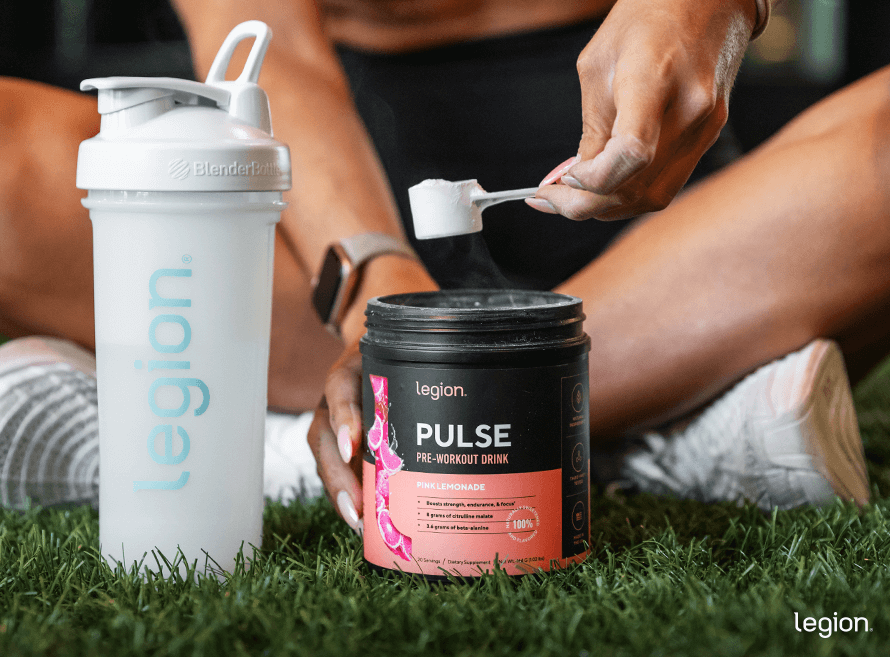
The main benefits of pre-workout are:
- Enhanced athletic performance: Ingredients such as caffeine, L-citrulline, beta-alanine, betaine, and creatine boost strength, enhance endurance, and reduce fatigue, which helps you train harder for longer and may increase muscle and strength gain over time.
- Improved focus: Compounds like caffeine, L-theanine, and L-tyrosine boost focus, alertness, and mood.
- Faster recovery: Creatine, L-citrulline, and taurine can help mitigate post-workout soreness and accelerate recovery.
Common Pre-Workout Side Effects and Safety Considerations
While pre-workout supplements offer numerous benefits, they can also have potential side effects, especially when not used as directed. Being aware of these can help you make informed decisions about their use.
Some common side effects include:
- Jitters and Anxiety: Due to the high caffeine content in many pre-workout formulas, some individuals may experience jitters, anxiety, or restlessness. This is particularly true for those sensitive to stimulants.
- Digestive Issues: Ingredients in pre-workouts, like caffeine or artificial sweeteners, may cause digestive discomfort for some users. This can manifest as stomach upset, bloating, or diarrhea.
- Increased Heart Rate and Blood Pressure: Stimulants like caffeine can cause a temporary increase in heart rate and blood pressure, which may be concerning for those with heart conditions or hypertension.
- Skin Tingles: Beta-alanine can cause your skin to tingle. This is harmless but it can be uncomfortable or distracting.
- Insomnia: Taking pre-workout supplements too close to bedtime, especially those with high caffeine content, can interfere with your sleep. If you like to train late in the day and want to prevent pre-workout from interfering with your sleep, opt for a stim-free pre-workout.
- Dependency: There is a potential for developing a reliance on pre-workout supplements for exercise performance, which can lead to overuse or misuse.
Should You Have Pre-Workout Before Bed?
If your pre-workout contains caffeine, it’s best not to take it close to bedtime.
A 2023 meta-analysis of 24 studies by Australian Catholic University found that caffeine makes you sleep 45 minutes less overall, spend 7% less of your time in bed asleep, take 9 minutes longer to fall asleep, and stay awake for a total of 12 minutes longer when you do wake up during the night.
The researchers also calculated how long before bed you’d need to avoid caffeine to completely prevent these effects. They found that you should avoid small caffeine doses (like a coffee) for about 9 hours before bed, and larger doses (like a pre-workout) for roughly 13 hours before bed.
That sounds extreme—and it is.
These are conservative, lab-based estimates designed to eliminate any impact on sleep. In reality, caffeine’s half-life varies widely—from about 2 to 10 hours, depending on factors like genetics and metabolism.
A more practical rule of thumb is to avoid caffeine within 6–8 hours of bedtime. So if you go to bed around 11 p.m., try to skip pre-workout after 3–5 p.m. to minimize sleep disruption.
And if you still find yourself lying awake, adjust accordingly—either take smaller doses or switch to a stimulant-free pre-workout for later sessions.
What’s the Best Pre-Workout?
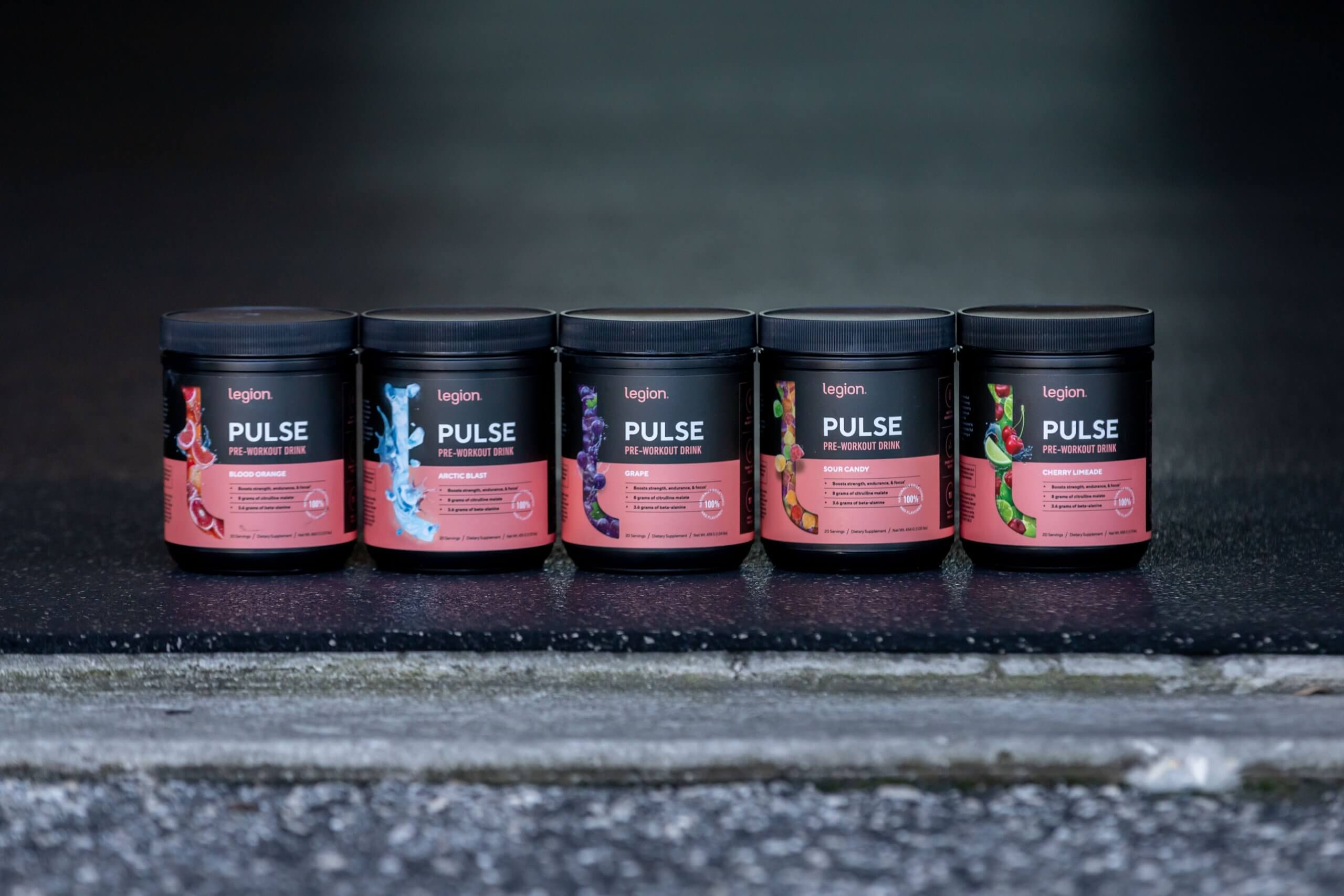
The best pre-workouts contain only proven ingredients in effective doses and are verified by independent labs to contain exactly what their label says.
And if you want a pre-workout that checks all these boxes, try Pulse.
Pulse is naturally sweetened and flavored and contains clinically effective doses of caffeine, L-theanine, citrulline malate, beta-alanine, alpha-GPC, and betaine. These are the six most research-backed pre-workout ingredients with more than 450 peer-reviewed studies supporting their efficacy.
Pulse also contains no added sugars, artificial sweeteners, flavors, dyes, fillers, or other unnecessary junk. And unlike most supplements on the market, every batch of Pulse is lab-tested for purity and accuracy and independently certified by Labdoor™ to meet or exceed FDA and WADA safety guidelines.
(If you’re uncertain whether Pulse suits your needs and budget, take the Legion Supplement Finder Quiz to learn what supplements are right for you. Click here to check it out.)
The Bottom Line on How Long Pre-Workout Lasts
Most pre-workouts last for about 1–2 hours, depending on the ingredients and your individual metabolism.
Caffeine is the main driver—it typically peaks about an hour after you take it and can stay active for up to 5 hours or more, especially if you metabolize it slowly. Other ingredients, like L-citrulline and betaine, act over shorter windows but still enhance performance throughout a typical workout.
In practice, this means that if you take your pre-workout roughly 30–60 minutes before training, you’ll feel its peak effects during the most demanding parts of your session. If your workout runs long, the benefits will gradually taper off but probably won’t disappear entirely.
If you train late in the day, remember that caffeine can linger in your system for hours—so avoid taking pre-workout within 6–8 hours of bedtime to protect your sleep quality.
FAQ #1: How late is too late for pre-workout?
If your pre-workout contains caffeine, it’s best to avoid taking it within 6–8 hours of bedtime. That means if you go to bed around 11 p.m., you should try to have your last dose of pre-workout no later than 3–5 p.m. to minimize the risk of sleep disruption.
If you train later in the day and find it’s keeping you awake, switch to a stimulant-free pre-workout for your evening sessions.
FAQ #2: Does water flush out pre-workout?
Not really—drinking water doesn’t “flush out” pre-workout or cancel its effects once it’s been absorbed. After you take pre-workout, ingredients like caffeine, citrulline, and beta-alanine enter your bloodstream and are metabolized by your liver and other tissues, not excreted immediately.
That said, dehydration can make some side effects—like headaches—feel worse, so drinking water alongside your pre-workout is still a good idea.
FAQ #3: Can I sleep after a pre-workout?
It depends on how sensitive you are to caffeine and how long before bed you take it.
Caffeine’s half-life averages around 5 hours, but it can range from 2 to 10 hours depending on your genetics and tolerance. That means a dose late in the day may still be active in your system at bedtime, which may make it harder to fall asleep or reduce your sleep quality—even if you feel tired.
Want More Content Like This?
Check out these articles:
Scientific References +
- Cholewa, Jason M, et al. “Effects of Betaine on Body Composition, Performance, and Homocysteine Thiolactone.” Journal of the International Society of Sports Nutrition, vol. 10, no. 1, 22 Aug. 2013, https://doi.org/10.1186/1550-2783-10-39.
- Research, Institute of Medicine (US) Committee on Military Nutrition. Pharmacology of Caffeine. Www.ncbi.nlm.nih.gov, National Academies Press (US), 2001, www.ncbi.nlm.nih.gov/books/NBK223808/#:~:text=The%20mean%20half%2Dlife%20of.
- Moinard, C., et al. “Dose-Ranging Effects of Citrulline Administration on Plasma Amino Acids and Hormonal Patterns in Healthy Subjects: The Citrudose Pharmacokinetic Study.” British Journal of Nutrition, vol. 99, no. 4, 22 Oct. 2007, pp. 855–862, www.cambridge.org/core/journals/british-journal-of-nutrition/article/doseranging-effects-of-citrulline-administration-on-plasma-amino-acids-and-hormonal-patterns-in-healthy-subjects-the-citrudose-pharmacokinetic-study/914C4C4EA85887DC2935740ACF8E36DE, https://doi.org/10.1017/s0007114507841110. Accessed 1 Nov. 2019.
- Hoffman, Jay R., et al. “β-Alanine Supplementation and Military Performance.” Amino Acids, vol. 47, no. 12, 24 July 2015, pp. 2463–2474, https://doi.org/10.1007/s00726-015-2051-9. Accessed 19 Aug. 2019.
- Hidese, Shinsuke, et al. “Effects of L-Theanine Administration on Stress-Related Symptoms and Cognitive Functions in Healthy Adults: A Randomized Controlled Trial.” Nutrients, vol. 11, no. 10, 3 Oct. 2019, p. 2362, https://doi.org/10.3390/nu11102362.
- Schwahn, Bernd C., et al. “Pharmacokinetics of Oral Betaine in Healthy Subjects and Patients with Homocystinuria.” British Journal of Clinical Pharmacology, vol. 55, no. 1, Jan. 2003, pp. 6–13, https://doi.org/10.1046/j.1365-2125.2003.01717.x. Accessed 10 Jan. 2021.
- Kawamura, Takashi, et al. “Glycerophosphocholine Enhances Growth Hormone Secretion and Fat Oxidation in Young Adults.” Nutrition (Burbank, Los Angeles County, Calif.), vol. 28, no. 11-12, 1 Nov. 2012, pp. 1122–1126, pubmed.ncbi.nlm.nih.gov/22673596/#:~:text=Glycerophosphocholine%20enhances%20growth%20hormone%20secretion%20and%20fat%20oxidation, https://doi.org/10.1016/j.nut.2012.02.011. Accessed 7 Aug. 2022.
- Dechent, P., et al. “Increase of Total Creatine in Human Brain after Oral Supplementation of Creatine-Monohydrate.” American Journal of Physiology-Regulatory, Integrative and Comparative Physiology, vol. 277, no. 3, 1 Sept. 1999, pp. R698–R704, https://doi.org/10.1152/ajpregu.1999.277.3.r698.
- Vidot, Helen, et al. “Randomised Clinical Trial: Oral Taurine Supplementation versus Placebo Reduces Muscle Cramps in Patients with Chronic Liver Disease.” Alimentary Pharmacology & Therapeutics, vol. 48, no. 7, 23 Aug. 2018, pp. 704–712, https://doi.org/10.1111/apt.14950. Accessed 9 Oct. 2022.
- Low, Jazreel Ju-Li, et al. “Genetic Susceptibility to Caffeine Intake and Metabolism: A Systematic Review.” Journal of Translational Medicine, vol. 22, no. 1, 22 Oct. 2024, p. 961, pubmed.ncbi.nlm.nih.gov/39438936/, https://doi.org/10.1186/s12967-024-05737-z.
- Bell, Douglas G., and Tom M. McLellan. “Exercise Endurance 1, 3, and 6 H after Caffeine Ingestion in Caffeine Users and Nonusers.” Journal of Applied Physiology, vol. 93, no. 4, 1 Oct. 2002, pp. 1227–1234, https://doi.org/10.1152/japplphysiol.00187.2002.
- Astrup, A, et al. “Caffeine: A Double-Blind, Placebo-Controlled Study of Its Thermogenic, Metabolic, and Cardiovascular Effects in Healthy Volunteers.” The American Journal of Clinical Nutrition, vol. 51, no. 5, 1 May 1990, pp. 759–767, https://doi.org/10.1093/ajcn/51.5.759.
- Glenn, Jordan M., et al. “Acute Citrulline Malate Supplementation Improves Upper- and Lower-Body Submaximal Weightlifting Exercise Performance in Resistance-Trained Females.” European Journal of Nutrition, vol. 56, no. 2, 11 Dec. 2015, pp. 775–784, https://doi.org/10.1007/s00394-015-1124-6.
- Derave, Wim, et al. “β-Alanine Supplementation Augments Muscle Carnosine Content and Attenuates Fatigue during Repeated Isokinetic Contraction Bouts in Trained Sprinters.” Journal of Applied Physiology, vol. 103, no. 5, Nov. 2007, pp. 1736–1743, https://doi.org/10.1152/japplphysiol.00397.2007.
- Trepanowski, John F, et al. “The Effects of Chronic Betaine Supplementation on Exercise Performance, Skeletal Muscle Oxygen Saturation and Associated Biochemical Parameters in Resistance Trained Men.” Journal of Strength and Conditioning Research, vol. 25, no. 12, Dec. 2011, pp. 3461–3471, https://doi.org/10.1519/jsc.0b013e318217d48d. Accessed 26 June 2020.
- Kreider, Richard B., et al. “International Society of Sports Nutrition Position Stand: Safety and Efficacy of Creatine Supplementation in Exercise, Sport, and Medicine.” Journal of the International Society of Sports Nutrition, vol. 14, no. 1, 13 June 2017, www.tandfonline.com/doi/full/10.1186/s12970-017-0173-z, https://doi.org/10.1186/s12970-017-0173-z.
- Cappelletti, Simone, et al. “Caffeine: Cognitive and Physical Performance Enhancer or Psychoactive Drug?” Current Neuropharmacology, vol. 13, no. 1, 13 Apr. 2015, pp. 71–88, www.ncbi.nlm.nih.gov/pmc/articles/PMC4462044/, https://doi.org/10.2174/1570159×13666141210215655.
- Bryan, Janet. “Psychological Effects of Dietary Components of Tea: Caffeine and L-Theanine.” Nutrition Reviews, vol. 66, no. 2, 4 Feb. 2008, pp. 82–90, https://doi.org/10.1111/j.1753-4887.2007.00011.x. Accessed 9 Feb. 2020.
- Jongkees, Bryant J., et al. “Effect of Tyrosine Supplementation on Clinical and Healthy Populations under Stress or Cognitive Demands—a Review.” Journal of Psychiatric Research, vol. 70, Nov. 2015, pp. 50–57, https://doi.org/10.1016/j.jpsychires.2015.08.014.
- Pérez-Guisado, Joaquín, and Philip M Jakeman. “Citrulline Malate Enhances Athletic Anaerobic Performance and Relieves Muscle Soreness.” Journal of Strength and Conditioning Research, vol. 24, no. 5, 2010, pp. 1215–22, www.ncbi.nlm.nih.gov/pubmed/20386132, https://doi.org/10.1519/JSC.0b013e3181cb28e0.
- Ra, Song-Gyu, et al. “Taurine Supplementation Reduces Eccentric Exercise-Induced Delayed Onset Muscle Soreness in Young Men.” Advances in Experimental Medicine and Biology, 1 Jan. 2015, pp. 765–772, https://doi.org/10.1007/978-3-319-15126-7_61. Accessed 24 Apr. 2023.
- Winston, Anthony P., et al. “Neuropsychiatric Effects of Caffeine.” Advances in Psychiatric Treatment, vol. 11, no. 6, Nov. 2005, pp. 432–439, www.cambridge.org/core/journals/advances-in-psychiatric-treatment/article/neuropsychiatric-effects-of-caffeine/7C884B2106D772F02DA114C1B75D4EBF, https://doi.org/10.1192/apt.11.6.432.
- Green, P J, et al. “The Effects of Caffeine on Blood Pressure and Heart Rate: A Review.” Annals of Behavioral Medicine : A Publication of the Society of Behavioral Medicine, vol. 18, no. 3, 1996, pp. 201–16, www.ncbi.nlm.nih.gov/pubmed/24203773, https://doi.org/10.1007/BF02883398.
- Chaudhary, Ninad S., et al. “Caffeine Consumption, Insomnia, and Sleep Duration: Results from a Nationally Representative Sample.” Nutrition, vol. 32, no. 11-12, Nov. 2016, pp. 1193–1199, www.sciencedirect.com/science/article/pii/S0899900716300454, https://doi.org/10.1016/j.nut.2016.04.005. Accessed 19 Aug. 2019.
- Meredith, Steven E., et al. “Caffeine Use Disorder: A Comprehensive Review and Research Agenda.” Journal of Caffeine Research, vol. 3, no. 3, Sept. 2013, pp. 114–130, https://doi.org/10.1089/jcr.2013.0016.
- Gardiner, Carissa, et al. “The Effect of Caffeine on Subsequent Sleep: A Systematic Review and Meta-Analysis.” Sleep Medicine Reviews, vol. 69, no. 101764, 6 Feb. 2023, p. 101764, https://doi.org/10.1016/j.smrv.2023.101764.
- Blanchard, J., and S. J. A. Sawers. “The Absolute Bioavailability of Caffeine in Man.” European Journal of Clinical Pharmacology, vol. 24, no. 1, 1983, pp. 93–98, https://doi.org/10.1007/bf00613933. Accessed 28 Nov. 2020.
